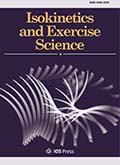Authors: Beals, Kim | Allison, Katelyn F. | Darnell, Matthew | Lovalekar, Mita | Baker, Rachel | Nieman, David C. | Vodovotz, Yoram | Lephart, Scott M.
Article Type:
Research Article
Abstract:
BACKGROUND: Tart cherry juice contains a high level of antioxidant and anti-inflammatory phytonutrients. Limited research has investigated its potential to ameliorate symptoms of delayed onset muscle soreness (DOMS) caused by inflammation from eccentric exercise. OBJECTIVE: The purpose of investigation was to assess the effect of a tart cherry beverage (TCB) on delayed onset muscle soreness (DOMS). METHODS: Participants underwent assessment of the quadriceps for pain, muscle tenderness, thigh girth, flexibility, strength, and markers of muscle inflammation and damage at baseline, immediately following, and 24 h, 48 h, 96 h, and one week post-eccentric
…fatigue protocol while consuming TCB (N = 15) or placebo (N = 14). Two-way mixed ANOVA assessed the effects of time, group, and interaction for all variables except pain, which was assessed using Wilcoxon rank sum tests (p < 0.05). RESULTS: No significant main effect of group and no significant interaction was demonstrated between group and time, but a significant main effect of time was revealed for thigh girth, tenderness, flexibility, and strength (p < 0.001-0.003). For pain, change over time from baseline to post-fatigue was higher in the TCB group (p= 0.008). No statistically significant main effect of time, group, or interaction effect between time and group was demonstrated for cytokine data. CONCLUSION: Results from this study provide important insights to methodological issues that will guide future studies using TCB including, dose of anthocyanins, muscle groups to study, fatigue protocols to use and length of supplementation.
Show more
Keywords: Tart cherries, anthocyanins, polyphenols, delayed onset muscle soreness, cytokines
DOI: 10.3233/IES-160645
Citation: Isokinetics and Exercise Science,
vol. 25, no. 1, pp. 53-63, 2017
Price: EUR 27.50





